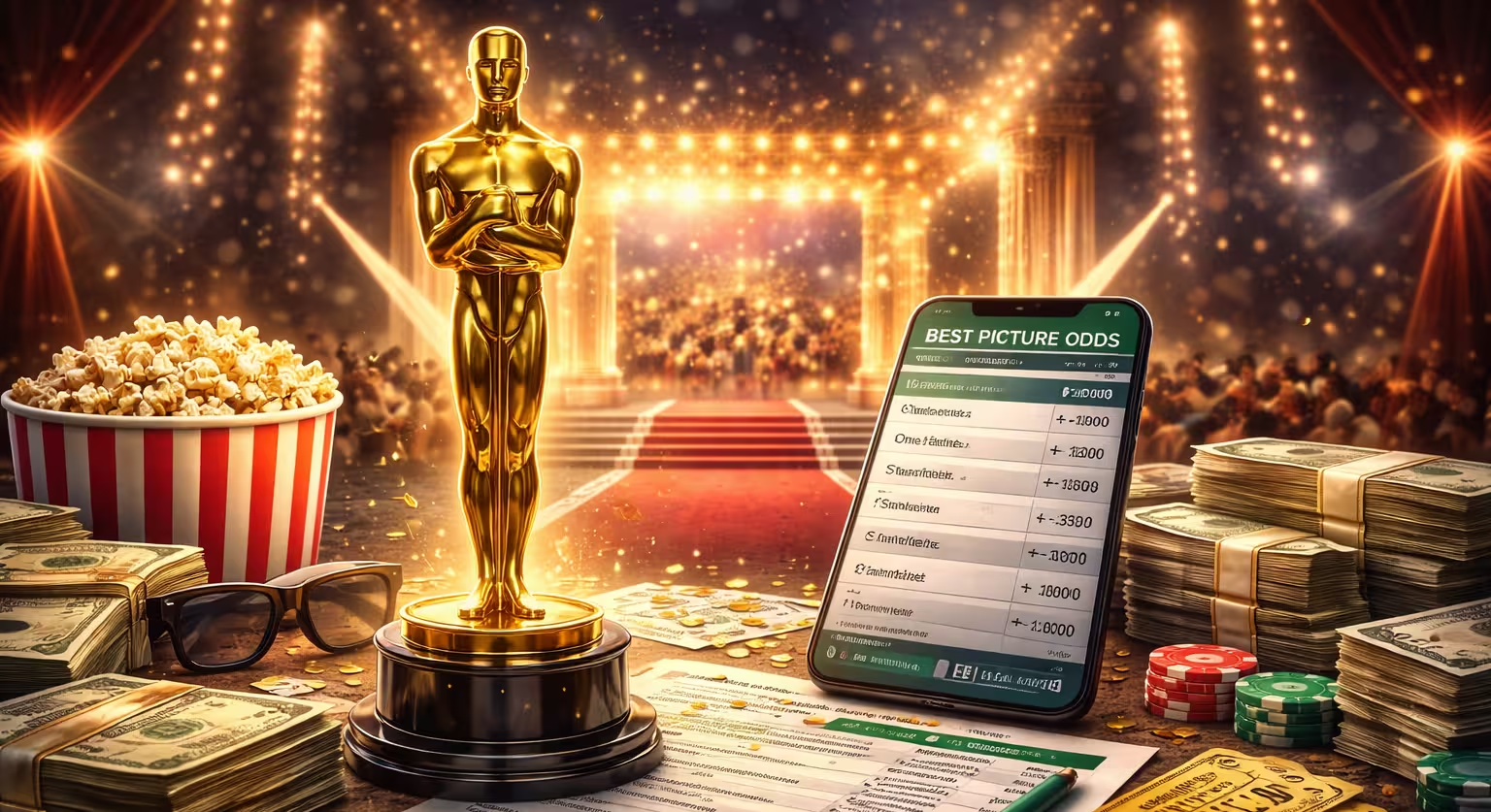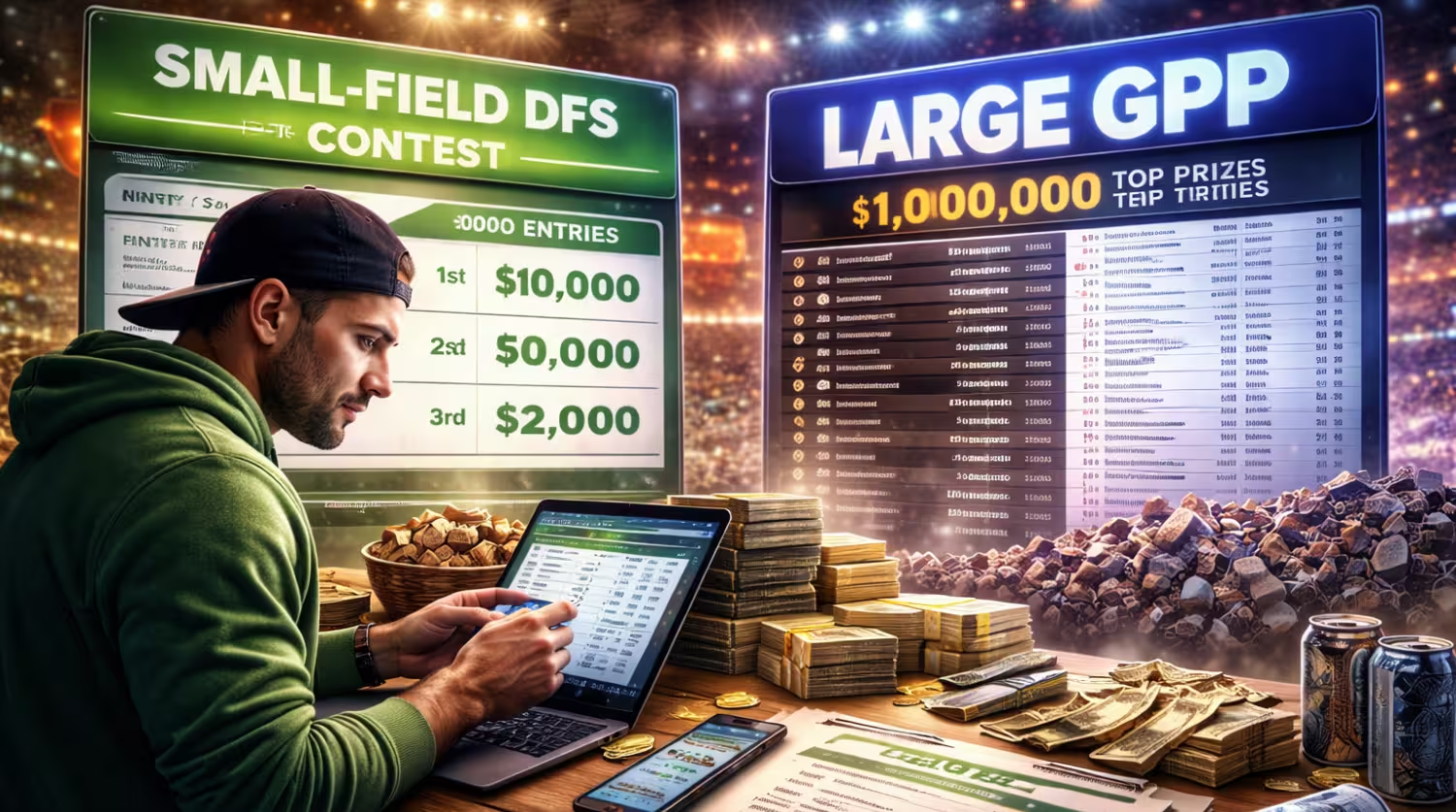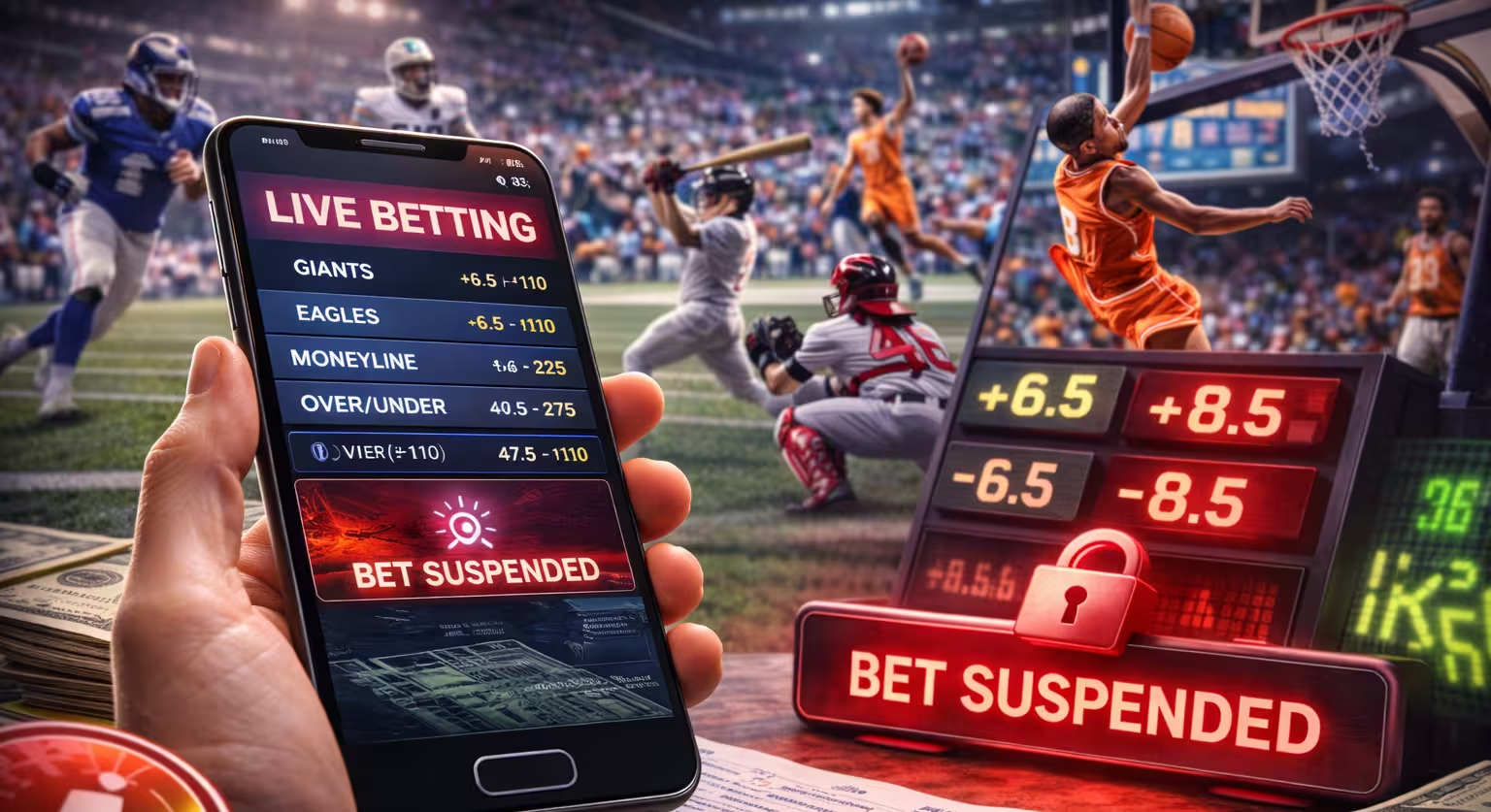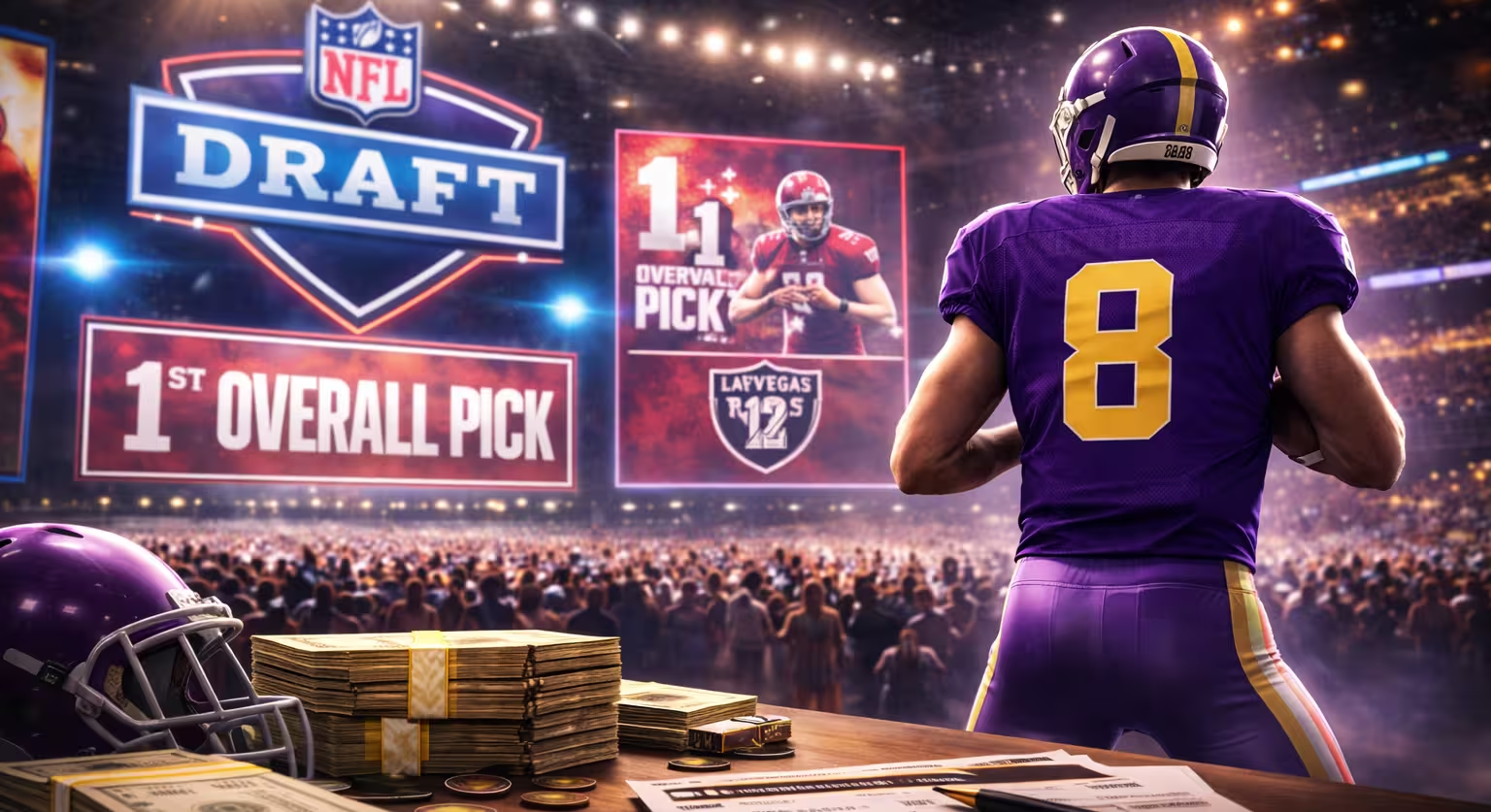Sports Betting vs. Casino Gambling: Which Is More Skill-Based?
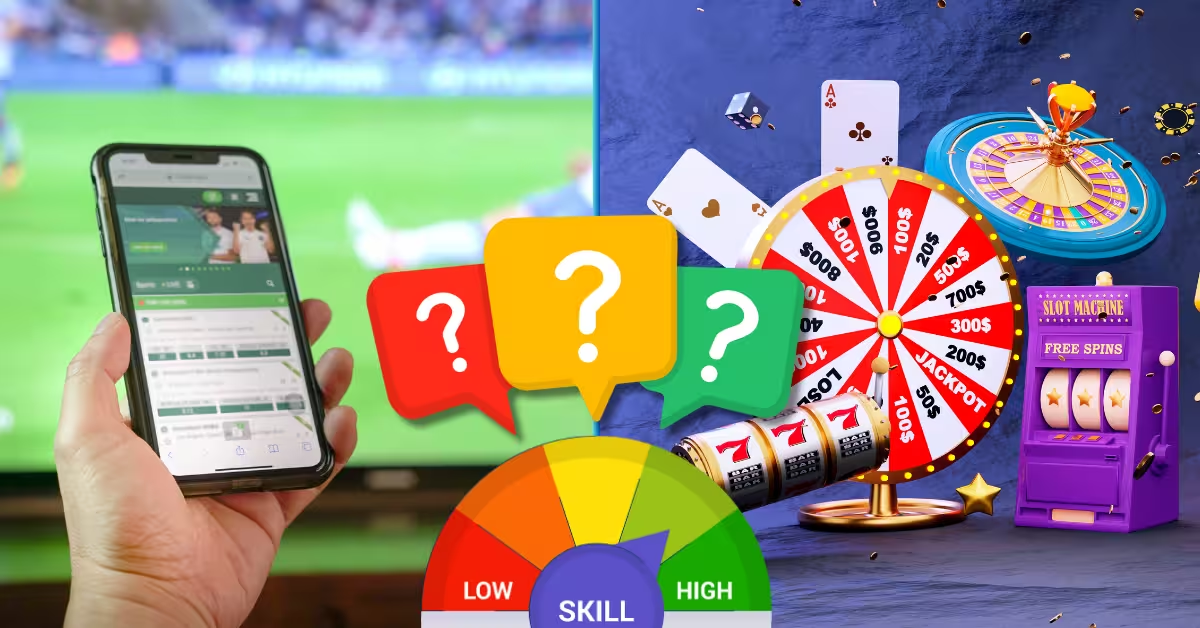
People love to think that they have an edge when they’re gambling. Why would you play otherwise? We get that! It’s a normal way to approach it.
But do you really have one? It’s an important question to ask yourself when your money is on the line! Are you really leveraging skill and knowledge, or are you just hoping that luck will smile upon you?
Sports betting and casino games both scratch the gambling itch, but they really differ in how much skill a player can use. Why? Because sports bettors do a lot of research, and when you’re playing a casino game, they’re engineered to be random.
Do either reward skills? Or is it all up to Lady Luck? This is the great debate between these two pastimes: skill vs. chance in sports betting and casino games. When we finish our exploration, you’ll know which one gives players a better chance, and why understanding the difference has such an impact on your bankroll!
Defining Skill vs. Chance in Gambling
First, let’s clarify what we mean when we say a “skill-based” game versus a game of chance. In skill-based gambling, your decisions and knowledge can influence the outcome.
In chance-based games, the outcomes are all random, and no amount of strategy can change the odds. Most gambling activities fall on a spectrum between these extremes. On one end, you have pure luck games like the lottery or roulette; each draw or spin is unpredictable. The odds of hitting the Powerball jackpot are about 1 in 292 million, which shows how little control a player has. On the opposite end of the spectrum are contests that are almost entirely driven by skill, like competitive poker.
Sports betting? That lies somewhere in the middle: it’s not as random as a lottery, but it’s also not as skill-dominant as poker.
Randomness and House Edge
Casino games are built around probability and statistics that favor the house over the long run. Every slot pull or roulette spin has outcomes distributed by design. You might get lucky in the short term, but the math guarantees that the casino makes a profit overall. In games of pure chance, zero amount of strategy can overcome this built-in advantage. If you play these games long enough, the results will inevitably align with the house edge and whittle down your bankroll. That’s why casinos love long play sessions; given enough time? The house always wins.
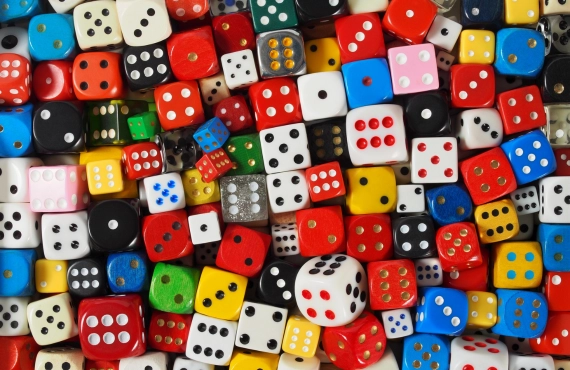
Skill-based gambling allows players to gain a long-term edge (or at least decrease the house edge) with expertise, strategy, and better decision-making. The important distinction is in the long-term vs. short-term outcomes.
- In the short run, luck can sway results in any game. A newbie could win a single poker hand against a pro with lucky cards, or a casual sports bettor might hit a big parlay one weekend.
- A long-term edge means that across dozens or hundreds of bets, the person who is making smarter decisions should come out ahead (or lose less) compared to someone who is relying totally on luck.
To illustrate, consider two extremes: slot machines vs. poker. Slots are 100% luck; you pull the lever and hope. There’s no decision that changes the outcome, and the machine is calibrated to pay out less than it takes in (aka the house edge). In contrast, poker is heavily skill-influenced: decisions like when to bet, fold, or bluff separate the winners from losers over time.
A study found that professional poker players won about 55% of their hands on average, and amateurs won only 45%. That difference, though it’s small per hand, is a meaningful edge gained by skill over the long run. The same logic applies to sports betting vs. most casino games; sports betting has more avenues for skill to make a difference, whereas typical casino games rely on chance.
The Case for Sports Betting as a Skill Game
Sports betting is often held up as a thinking person’s gamble. Unlike spinning a wheel or feeding a slot, betting on sports allows (and arguably requires) you to do tons of research, analyze info, and make informed predictions. Below is why so many argue that sports wagering is a skill-based endeavor!
Successful sports bettors treat it pretty much like an investment or a job. They study team statistics, player performance, weather conditions, injuries, and countless other factors before they place a wager. By crunching numbers and staying informed, you can identify bets that have value; where the odds offered are better than the true probability of an outcome.
Professional bettors can spend up to 40–60 hours a week analyzing games and developing models to find an edge. And all of this homework does pay off. If you know a star quarterback is injured (and the market hasn’t adjusted the odds yet), your knowledge can lead to a smarter bet than the average person who just bets on the favorite.
Past just picking winners, skillful sports betting involves strategy in how you bet. This includes managing your bankroll wisely and choosing the right spots to bet. A big part of the sports betting skillset is understanding odds and line movement.
Sports odds aren’t fixed; bookmakers adjust the lines as money comes in or news breaks. A skilled bettor monitors all of these shifts. If the public is heavily betting on one side because everyone is hyped about Team A, the odds can move to favor Team B, creating a potential value opportunity for contrarian bettors.
Sharp bettors also pay attention to “sharp money,” which is bets from respected, knowledgeable players, as they signal the more informed side of a wager. In some cases, experienced bettors can even influence the odds themselves. Skilled gamblers will place small decoy bets to move the point spread, then hammer the favorable line with a big bet. It’s a more advanced tactic, but it underscores how much strategy can matter in sports betting.
Skill in sports betting isn’t only picking the right team; it’s also how you manage your money and optimize your bets. Smart bettors employ techniques like value betting (only betting when the odds are in your favor relative to true probability) and arbitrage (betting on all outcomes via different bookmakers to lock a small profit when possible). An important concept is closing line value (CLV), which is a metric that compares the odds you bet vs. the final closing odds.
Consistently “beating the closing line” (getting a better number than the closing odds) is considered a hallmark of skilled bettors. If you bet a football team at +3 (underdog by 3 points) early in the week, and by game time the line moves to +1, you’ve beaten the closing line. Even if that particular bet loses, making bets at better odds than the market’s final consensus means in the long run you’re likely to profit.
This is why the smartest gamblers shop for the best lines across sportsbooks! They compare odds on DraftKings vs. FanDuel, and usually bet early before lines sharpen. They also practice discipline in bet sizing, like risking only 1-2% of their bankroll on a given play, to survive the swings of variance. All of these skills in money management separate sustainable betting strategies from reckless gambling.
Perhaps the strongest argument that sports betting can be skill-based? The existence of people who consistently win. The truth is, most sports bettors lose money because sportsbooks wouldn’t exist if everyone beat them.
Estimates suggest only about 1–5% of bettors are profitable long-term, and they are always the disciplined, analytical ones. These are professional bettors or handicappers who find an edge over the house’s odds. Ever heard of legendary sports bettor Billy Walters? It’s said that he earned hundreds of millions of dollars over his career by outsmarting the bookmakers. How? Walters used computer models and a network of informants to identify mispriced lines and would place massive bets (indirectly to avoid detection) to capitalize on them. He’s an extreme outlier, but he proved that skill and strategy can yield consistent profits in sports betting. Even on a smaller scale, there are sports betting syndicates and sharps who grind out profits season after season by staying a step ahead of the oddsmakers.
Modern sports bettors also have an array of tools that make it more of a skill game. Data analytics, predictive algorithms, and AI models are used to project game outcomes. A casual bettor can subscribe to services that provide advanced statistics or use software to track bets and performance. Most serious bettors keep detailed records of all their wagers to analyze what’s working. There are also betting exchanges and odds-tracking apps that help identify when a line is off. All of these tools can improve a bettor’s results, but only if they are used with skill and understanding.
All that said, luck still plays a big role in sports betting, no question about it. Unexpected things happen in sports all the time, like a last-second fumble, a freak injury, or a bad ref call, and even the best bettor will have losing streaks. But over the long haul? Skillful bettors do believe they can tilt the odds in their favor.
They accept short-term luck (good or bad) as part of the game, and focus instead on making smart decisions that should yield profits in the long run. The 3% of bettors who do win long-term prove that sports betting isn’t just random luck. It’s difficult—extremely difficult—to beat the sportsbooks consistently, but it is possible with the right knowledge, strategy, and discipline.
The Case for Casino Gambling as a Skill Game
Okay, so when you think of casino gambling, “skill” probably isn’t the first word that pops into your mind. Slot machines and the roulette wheel ooze pure chance. And indeed, most casino games are designed so that no strategy can overcome the built-in odds. But there are a few corners of the casino where player skill can make a noticeable difference!
Casinos do have a handful of games where decision-making matters. The prime examples? Poker and blackjack. Poker, because you’re playing against other people, not the house, so a skilled player can regularly outplay less skilled opponents and take their money. That’s why poker is considered a game of skill, so much that it’s not legally classified as “gambling” in some jurisdictions. As we said earlier, skilled poker pros win a higher percentage of hands and money than amateurs.
When you play blackjack, you are playing against the dealer, who has an element of skill in terms of optimal strategy. You make decisions on each hand—hit, stand, double down—and those choices have mathematically “correct” moves. A player following basic strategy, which is the mathematically best move for every card combo, can decrease the house edge to as low as 0.5%.
That’s a really small edge for the house, so a skilled blackjack player loses only about 50 cents on average per $100 bet, compared to an unskilled player who might be up against a house edge of 2-8% because of mistakes. In games like video poker, using proper strategy can also bring the return-to-player (RTP) percentage super close to 100%.
In addition to basic strategy, there are certain casino games that allow for advantage play techniques that give the player a long-term edge. The most famous? Card counting in blackjack. By keeping track of what cards have been dealt, a skilled card counter can tell when the remaining deck is rich in high cards, which is favorable to the player. Then they raise their bets, and when the deck is unfavorable, they bet minimal amounts.
This technique, if done adeptly, can turn that 0.5% house edge to about a 1% player edge in a blackjack game. A card counter can beat blackjack in the long run, and casinos know it. They shuffle the deck more often, ban known counters, or use multiple decks to make counting harder. Still, blackjack offers a sliver of hope where skill and stealth can turn into profits.
Other advantage plays include looking for dealer errors, exploiting promotion loopholes, or “hole carding” (gleaning a look at the dealer’s facedown card), all of which are highly skillful (and sometimes ethically gray) tactics. Outside of blackjack, skilled video poker players hunt for specific machines with favorable pay tables and combine expert play with casino comps to gain an edge. Poker, as we said, is beatable by skill, and there are pro poker players who make their living in casino card rooms at games like Texas Hold’em and Omaha, where the casino only takes a small rake from each pot but doesn’t mind who wins.
Despite the above examples, the vast majority of what you’ll find on a casino floor leaves almost no room for skill. The slot machines, roulette wheels, craps tables, keno draws; all are fundamentally games of chance with a programmed advantage for the house. No strategy can predict where a roulette ball will land or what symbols the slot reels will stop on. Each spin is independent and random. In roulette, bets pay 35-to-1 on a single number, but the true odds are 37-to-1 (on a double-zero wheel), yielding a 5.26% house edge every spin.
Craps has bets with a low house edge (some under 1%), but again the outcomes are pure dice rolls; you can choose bets that minimize the edge, but you cannot change the odds.
Slot machines are the worst for players: they have some of the highest house edges (slot hold percentages can range from 5% to 15% or more for the casino), and they involve zero skill. You just press a button. The outcomes are determined by random number generators that guarantee a certain percentage payout over time called RTP (return to player), and it’s typically 85-97% on slots, meaning the house keeps 3-15%. You can’t improve your chances by playing better on a slot; you can only get lucky or not.
House edge and payout structures are such that, over the long term, a player will lose money on these games, guaranteed. It’s worth emphasizing that even in the most skill-influenced casino games like blackjack, the best you can do (without special advantage tricks) is roughly break even, and in everything else, the odds are against you. The casino’s profit margins are literally built on the assumption that chance, not your skill, dictates the outcomes.
Casinos are masters at leveraging human psychology. Almost all games feel like they involve skill or give the player a sense of control when they don’t. Take slot machines: the “Stop” button that lets you halt the spinning reels? It can make you feel like your timing mattered, but in truth, the result was decided the moment you hit “Spin.”
Stopping the reels doesn’t change the outcome at all; it’s purely for player satisfaction. Studies have found that features like stop buttons encourage an erroneous perception of skill in slots. Similarly, slot machines will tease you with “near misses,” like when the jackpot symbol lands just one spot above or below the payline. It feels like you “almost” won, and players interpret that as being somehow due or getting closer, which is an illusion.
The near-misses increase players’ motivation to keep playing, tricking the brain into a false sense of control or progress. Another example is craps: players rolling the dice have their own little rituals and genuinely feel their throw influences the result (“setting” the dice, blowing on them for luck, etc.). While dice setting is a debated concept, those actions don’t change the random outcome, but it does make them feel involved and skillful.
Casinos design electronic roulette or craps games with touchscreens where you “toss” a digital ball or dice, imitating a skill gesture while still giving a random result. This mimicry of skill keeps players engaged and betting. It’s the psychology of gambling: humans are wired to find patterns and to believe they have control, which is known as the illusion of control. Casino games exploit this by giving just enough interactivity or near-success feedback to make you think your choices mattered, when in reality, luck was always in control.
Casino gambling is predominantly luck-driven, with a few notable exceptions. Games like poker and blackjack provide a space for skilled players to excel (to a degree), and a handful of elite gamblers have found ways to beat the house using skill and smarts. Those are the exceptions, not the rule. The typical casino offering is not designed to reward skill; it’s designed to be a fun, random flutter where the odds favor the house. The average person playing slots or roulette has essentially no chance to improve their expected outcome with skillful play. You might get lucky, you might have a big win, but that’s just variance smiling on you for a moment.
Head-to-Head Comparison
To really crystallize the differences, below is a side-by-side comparison of sports betting versus casino gambling that hits on several important dimensions!
| Feature | Sports Betting | Casino Gambling |
|---|---|---|
Skill Involvement | High (with strategy): Your research and decisions can have a significant impact on outcomes. | Low to Moderate: Most games rely on luck, with a few (poker, blackjack) allowing some strategy. |
Variance | Medium-High: Upsets and swings happen, but skill can smooth results over time. | High: Outcomes are highly unpredictable and can swing wildly; luck dominates in the short run. |
Long-Term Profit Potential | Yes (with edge): A small percentage of bettors can profit long-term by skillfully exploiting odds. | Rare: Except for skilled poker or blackjack play, the house edge makes long-term profit unlikely. |
Tools for Players | Data analysis, models, line shopping, bet tracking software, expert picks; there are plenty of resources to improve betting decisions. | Basic strategies for a few games (e.g., blackjack charts, poker knowledge); otherwise, mostly bankroll management to endure luck. |
Public Perception | Strategic: Often seen as a form of analysis or investing (e.g., “handicapping” games like an expert). | Recreational/Luck-based: Viewed as a fun diversion; big wins are seen as lucky streaks rather than mastery. |
Why It Matters for Your Gambling Strategy
Understanding whether a game is skill-based or luck-based isn’t just an academic exercise; it has real implications for how you should approach gambling and where to put your time and money!
Sports Betting
If you want to minimize randomness and have a say in the outcome, sports betting gives you way more to work with. It rewards preparation. You can study, hone your prediction models, learn from each bet, and gradually improve. If you’re the type of person who likes studying stats, following news, and seeking patterns? Sports betting is the more of the two.

The ability to find an edge means you at least have a chance at long-term profit (though as we’ve said, it’s difficult). From a strategy perspective, this means investing your energy in developing skills; you have to learn about bankroll management, understand how odds are made, practice picking value bets, etc. Over time, a skilled sports bettor can get better at avoiding sucker bets and focusing on wagers where the odds are in their favor.
Casino Gambling
Casino gambling is easier to get into for a beginner, but far harder (virtually impossible) to beat in the long run. If you’re looking for a quick thrill with no homework required, casino games are literally designed for that. You can sit down at a slot machine or a roulette table and play with no knowledge needed, just money and a willingness to risk it.

This makes casino games great for entertainment; it’s fun! And fun is a perfectly valid reason to gamble, as long as you do so responsibly. But you have to be aware that you’re unlikely to win long-term at these games. The longer you play, the more certain it becomes that the house edge will eat away at your funds.
So if you do choose casino gambling, your strategy should be centered on entertainment and budget. Set strict limits, treat any wins as lucky bonuses, and know when to walk away. It’s not a domain where doubling down on effort yields better results; playing longer or “trying harder” won’t overcome the math. Most casino games thrive on a negative feedback loop: losing players will keep chasing losses or believe a win is “due,” and that just leads to more losses. Don’t fall into that trap, and accept that luck is in control.
Risk Tolerance/Goals
Risk tolerance and personal goals also come into play.
| Sports Betting | Casino Gambling |
|---|---|
Sports betting, with a mixture of skill and uncertainty, usually has a moderate variance if you stick to single bets (you’ll win around 50-55% on good days, lose about the same on bad days if you’re somewhat skilled). But if you lack skill or discipline, you can still lose a lot; sometimes more slowly, but inevitably. | Casino gambling, except for poker, has a higher variance. You could go bust quickly or hit a big win, but you can’t control it. If you’re someone who can’t tolerate the idea that you have no control, you will find pure luck games maddening. If you’re gambling strictly for excitement and leisure? The strategic aspect of sports betting might not be enjoyable for you, whereas a night at the casino will be just the ticket. |
Profit Goals
If your aim is to make money or at least not lose money gambling, you should pick sports betting, poker, or potentially blackjack (with a lot of practice and maybe some card counting).
Be prepared to treat it seriously: it entails lots of learning, analyzing results, and being super disciplined. It might even mean specializing in one sport or one game type so you can become an expert in that one niche.
And even in sports betting, only a tiny percentage of people can make a living or make a significant profit from it. But at least you’re fighting a winnable fight, compared to, say, trying to beat the slot machines (which is unwinnable by design). The upside of skill games is that with dedication, you can noticeably improve your results. The downside? It can feel like work and takes a lot of patience, as you won’t win every time, even when you do everything right.
If your goal is pure entertainment and you don’t care if you lose a set amount of money, as you just want to have fun, then the distinction matters less, and it becomes a matter of preference. Do you like the analytical process of sports, or the sensory thrill of the casino? You’ll probably prefer casino gambling in that case, because it’s simple fun.
Tips for Skill-Based Gambling Success
Looking for some tips? We have them! Look below for ones you can apply to skill-based gambling.
- Track Closing Line Value (CLV): This is your reality check. If you consistently bet at better odds than where the line ends up, it’s a good sign you’re reading the market well, even if every result doesn’t go your way. Long-term, beating the closing line is a really strong indicator of skill.
- Use Bet Tracking Software: Don’t rely on your memory. Keeping track of your bets, stakes, and outcomes helps you spot trends, identify leaks, and stop lying to yourself about how well you’re doing. It’s also a way to see where you might already have an edge.

- Study Line Movement and Public Betting Trends: Understanding how odds shift, and why can separate you from casual bettors. If a line moves away from the popular side, that’s usually a clue about where sharper money is going. Use that info to time your bets and avoid inflated lines.
- Stick to Bankroll Rules: The best edge in the world won’t matter if you’re betting too much on a single game. Set a fixed percentage per bet and resist the urge to chase bigger payouts. Discipline keeps you in the game long enough for your skill to matter.
- Never Chase Losses: Everyone takes a hit. What matters is how you respond. Doubling your bets after a losing streak isn’t bold, it’s reckless. Staying calm, sticking to your system, and logging off when you’re tilted are the traits of a skilled player.
Conclusion: Skills or Thrills?
If you’re putting money on the line, you should know what you’re playing for! Sports betting does reward effort, but it asks for a lot of it. Casino gambling? It’s all luck dressed up in lights and sound—that is, unless you’re sitting at a poker table or counting cards without getting caught.
There’s no shame in choosing fun over profit, but you can’t confuse the two! If you’re after wins, pick a game where your decisions will matter. If you’re only chasing a high, don’t fool yourself that you have a strategy.
Here’s a recap of the sports betting vs. casino gambling debate:
- Sports betting gives you way more room to apply skill, but it’s by no means automatic. You’ll need to study, track, and stay disciplined if you want to win.
- All casino games run on luck. If there’s any edge to be had, it’s in poker or blackjack with strategy. The rest? The house rules.
- This isn’t about better or worse! It’s about knowing what you’re after. Want control and a shot at profit? Go where skill matters. Want quick hits and fun? Casino gambling it the one for you!

Alyssa contributes sportsbook/online casino reviews, but she also stays on top of any industry news, precisely that of the sports betting market. She’s been an avid sports bettor for many years and has experienced success in growing her bankroll by striking when the iron was hot. In particular, she loves betting on football and basketball at the professional and college levels.





